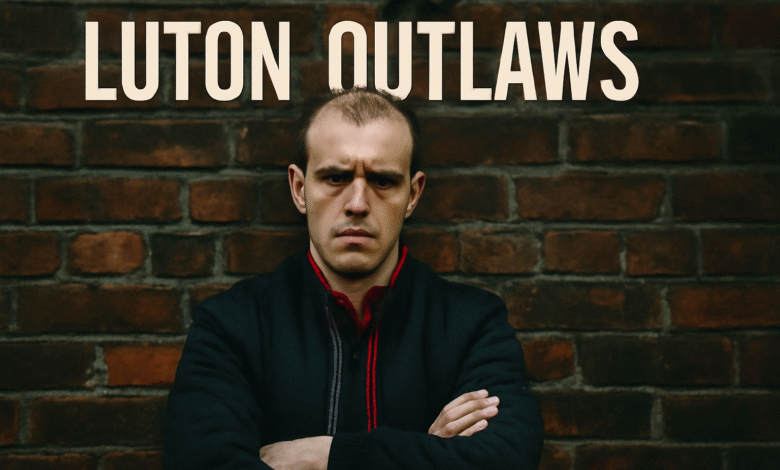The Luton Outlaws: A Deep Dive into Their Legacy, Influence, and Cultural Impact

The name “Luton Outlaws” has captured the imagination of many, especially those who are familiar with the vibrant and rebellious subcultures that have shaped British society over the years. A term that might evoke images of rebellious youth, anti-establishment attitudes, and a fierce dedication to standing apart from the mainstream, the Luton Outlaws have left a profound mark not just on the town of Luton, but on the cultural landscape of the United Kingdom. While their origins and activities are often shrouded in mystery and sometimes controversy, there’s no denying their lasting influence in music, fashion, and youth culture. In this comprehensive article, we’ll explore the evolution of the Luton Outlaws, their impact on local and national culture, the controversies surrounding them, and the legacy they’ve left for future generations.
The Origins of the Luton Outlaws: A Product of Their Time
The story of the Luton Outlaws begins in the working-class town of Luton, located in Bedfordshire, England. While Luton has always been known for its hat-making industry, in the late 20th century, it became more famous for its association with a burgeoning youth subculture that rejected mainstream values. During the 1980s and 1990s, economic hardship, high unemployment, and a lack of social mobility led to a feeling of disenfranchisement among young people. Many felt disconnected from society’s traditional structures, including educational institutions, the job market, and even their own families.
As industries in the town began to decline, and Luton struggled to reinvent itself in a rapidly changing economy, young people found solace in alternative lifestyles. Amidst this environment, the Luton Outlaws emerged. They weren’t a structured group in the traditional sense, but rather a loose collective of individuals who shared a common set of values: rebellion against authority, defiance of societal norms, and a celebration of individuality.
The Luton Outlaws became a direct response to the challenges and frustrations that many young people in the town faced. They took pride in their outsider status and embraced an anti-establishment ideology. This led them to embrace a wide variety of cultural influences—from punk rock and ska to hip-hop and graffiti—creating a distinctive subculture that was as diverse as it was unique. The Luton Outlaws didn’t just reject societal norms; they sought to create their own identity, free from the constraints of traditional culture.
Cultural Impact and Influence on Fashion, Music, and Identity
One of the most notable aspects of the Luton Outlaws was their influence on fashion and music, both of which played an essential role in shaping their identity. The Outlaws were never content with following the trends set by the mainstream. Instead, they created their own style that was defined by a mix of various subcultures.
Fashion-wise, the Luton Outlaws adopted an eclectic mix that blended elements of punk rock, goth, and skinhead styles, while also incorporating urban influences like hip-hop and streetwear. They were often seen sporting bold, statement-making clothing such as leather jackets, ripped jeans, band t-shirts, and heavy boots. The Outlaws were not afraid to stand out from the crowd, and their fashion choices reflected their desire to be recognized as individuals, not as part of the homogenized masses.
Music played an equally significant role in the Luton Outlaws’ identity. Punk rock, ska, and grime music were all key elements of the soundtrack to their lives. The raw energy and anti-authoritarian messages of punk rock resonated with the Outlaws, who saw themselves as outsiders fighting against the status quo. Similarly, the ska movement, with its roots in working-class communities and its fusion of Jamaican reggae and British pop, found a home among the Outlaws. For them, music was more than just a form of entertainment; it was an expression of defiance and a vehicle for self-expression.
The Outlaws were also heavily involved in the local underground music scene, attending gigs and concerts, and supporting emerging bands that shared their anti-establishment ethos. This participation in the underground music scene not only strengthened their sense of community but also helped to cement their place as key figures in Luton’s cultural landscape.
The Controversies of the Luton Outlaws
While the Luton Outlaws are celebrated by many for their individuality and defiance of societal norms, their actions have not been without controversy. Over the years, the group has faced criticism, often linked to their association with anti-social behavior, criminal activities, and violent confrontations. Some factions within the Luton Outlaws have been accused of engaging in petty crime, vandalism, and clashes with law enforcement. For many, this reinforced the idea of the Outlaws as rebellious troublemakers, rather than simply a cultural movement.
The media, in particular, has played a significant role in shaping the public’s perception of the Luton Outlaws. News outlets have often painted them as dangerous and disruptive, casting them as a threat to social order. However, this portrayal fails to capture the full complexity of the group. While some members may have engaged in illegal activities, the broader movement was, for many, a means of expressing frustration with the lack of opportunities in their lives. For these individuals, being an Outlaw was not necessarily about lawbreaking but about breaking free from the constraints of society’s expectations.
It is also worth noting that the term “Outlaw” itself is a loaded one. To be an outlaw is to exist outside of society’s rules, and for many young people in Luton, the term carried with it a sense of pride and empowerment. By embracing this label, the Outlaws were signaling that they were not afraid to challenge authority and reject the norms that had been imposed upon them.
The Luton Outlaws’ Enduring Legacy
Despite the controversies and the passing of time, the legacy of the Luton Outlaws continues to influence new generations. Their anti-establishment values and their commitment to individuality resonate with many young people who feel marginalized or disconnected from society. In a world where conformity is often celebrated, the Outlaws’ emphasis on independence and self-expression serves as a powerful reminder that it’s okay to stand apart from the crowd.
In recent years, there has been a resurgence of interest in the Luton Outlaws, particularly among young people looking for an alternative to the mainstream. Whether through music, fashion, or social media, the Outlaws’ ethos has found new life in the digital age. The rise of alternative subcultures on platforms like TikTok and Instagram has allowed a new generation of Outlaws to connect with one another, share their experiences, and express their identities in ways that were not possible for previous generations.
Moreover, the Outlaws’ influence can still be seen in the music scene, where genres like grime, punk, and indie continue to thrive. The rebellious spirit of the Luton Outlaws lives on in the music of up-and-coming artists who are determined to challenge the status quo and make their voices heard.
Read also: 1988 Kawasaki JS550 Mikuni BN38 High/Low Settings: A Guide to Optimal Carburetor Adjustment
Conclusion
The Luton Outlaws may have started as a reaction to economic hardship and social discontent, but their impact has been far-reaching. Through their unique style, their participation in underground music scenes, and their embrace of rebellion, they carved out a space for themselves in a world that often seems intent on marginalizing those who don’t conform. While they have faced criticism and controversy, the Luton Outlaws remain a symbol of resistance and individuality, inspiring new generations to question authority and embrace their true selves.
In the end, the Luton Outlaws represent something much larger than just a group of rebellious youths from a small town. They embody the universal desire for freedom, self-expression, and the courage to stand up against the constraints of society. As their legacy continues to shape culture in the UK and beyond, one thing is clear: the Luton Outlaws are far from forgotten, and their story is far from over.



